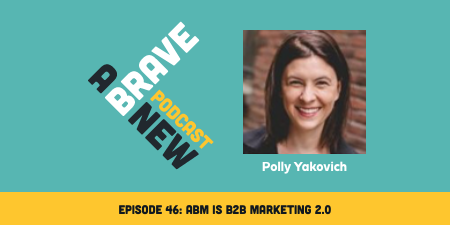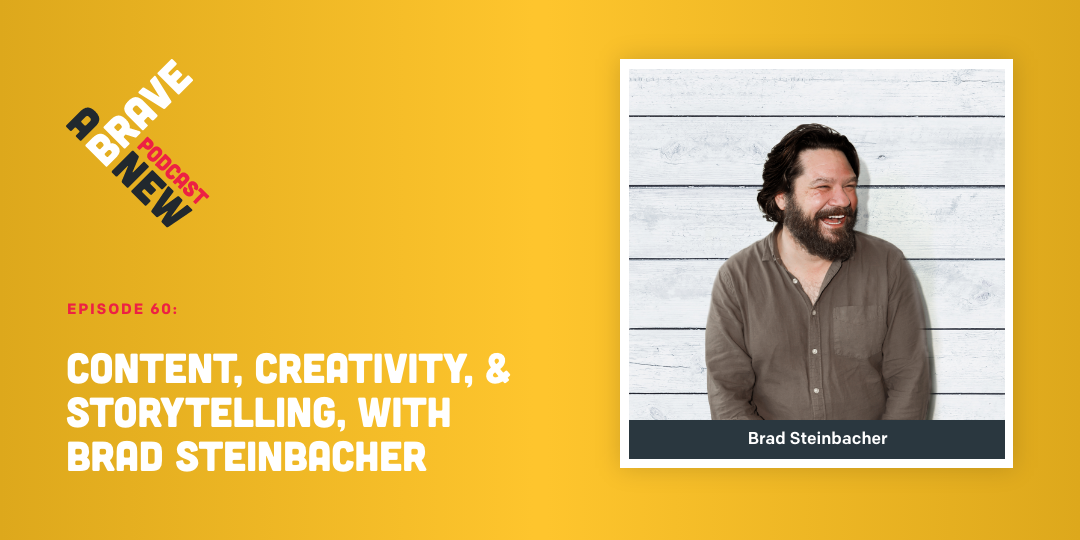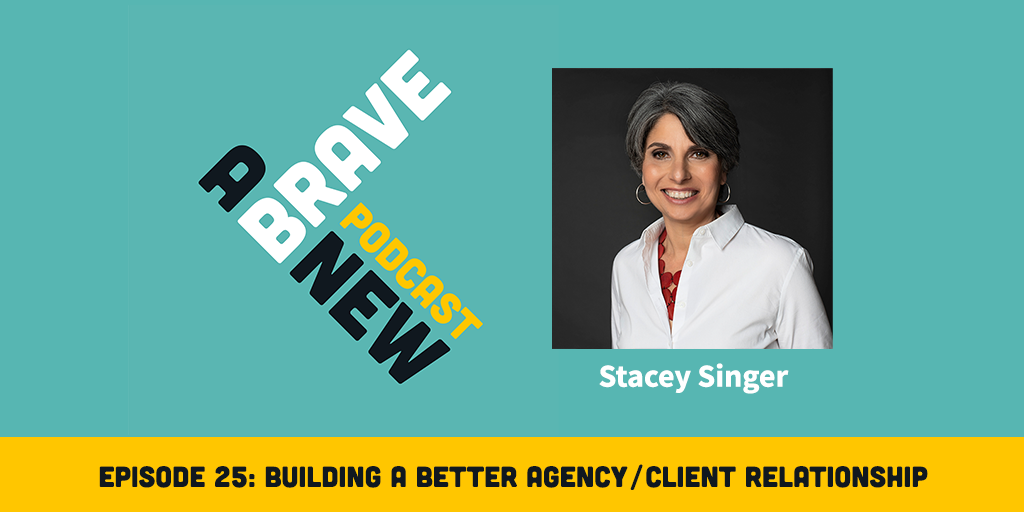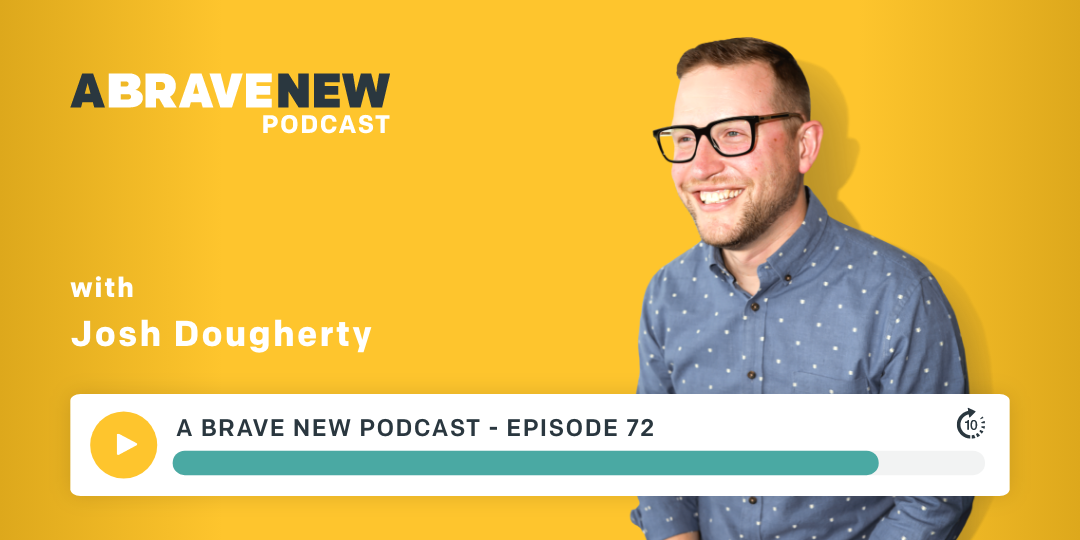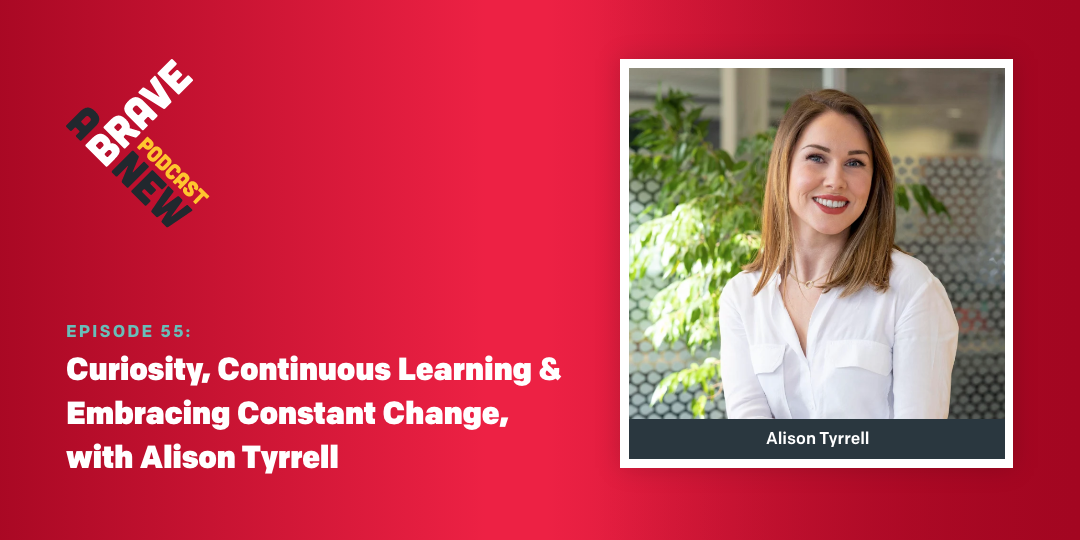Josh Dougherty is a brand strategist, speaker, and the founder and CEO of A Brave New, a Seattle-based B2B digital marketing agency specializing in tech and healthcare. Over the last decade plus, he’s worked with clients to develop unique brands and accelerate business growth using web design, inbound marketing, account-based marketing strategies.
What you’ll learn about in this episode:
- Strategies to consider for your marketing program in the face of economic uncertainty
- Imperative 1: Protecting your marketing spend
- How to protect your marketing spend in the face of economic uncertainty
- Why companies who continue to invest in marketing experience less revenue loss (research!)
- Imperative 2: Navigating AI content creation
- The impact that Chat GPT will have on content creation, and whether or not we should be afraid of it as marketers
- Things to watch out for as you begin to leverage AI for your content creation efforts
- Imperative 3: Focusing on your unique value from your customer’s perspective
- How great brands align their content to what their customers need
Additional resources:
- Blog Post: 3 Imperatives For B2B Marketing Leaders As We Kick Off 2023
- Marketing Profs Article: Customer-Centric Companies Win in Recessions: How Customer Insight Cushions Downturns and Speeds Recovery
- Josh Dougherty on LinkedIn
- Josh Dougherty’s Public Speaking Site
- A Brave New’s Website
Transcript:
Intro:
Welcome to A Brave New Podcast. This is a show about branding and marketing, but more than that, it's an exploration of what it takes to create brands that will be remembered and how marketing can be a catalyst for those brands’ success. I'm Josh Dougherty, your host. Let's dive in.
Josh:
Hello and welcome to the year 2023. I'm recording this on January 4th and really excited to be with you as we look forward to what the new year looks like and what we should all be thinking about as B2B marketers as we kick it off.
I think one of the things I reflected on a lot over the holiday is this dichotomy we're currently living in. First of all, as 2023 really dawns, there's a lot of uncertainty in the air right now. Just like for most of 2022, the economy is continuing to send conflicting signals. Inflation, maybe, is beginning to drop a little bit, but interest rates are high. Many of the economic indicators are mixed, and I think—as you look out through this kind of the economic climate—people are nervous about what's going to happen, nervous about what's to come, and at the same time, as we flip the page over to a new year, I think new years are a time for hope, opportunity, excitement. There is a sense that there's an infinite amount of possibilities to build towards. And, one of the things I really love about this time of year is that it's an opportunity to really imagine what we might be able to accomplish if we can put in place a smart strategy, a good team, and really, I think at the end of the day, have some stick-to-it-ness when it comes to execution. And so, as I'm starting this year, I think I'm trying to hold both those things in balance.
Personally, I'm choosing to embrace the potential of the new year rather than the uncertainty of the economy. I really hope you will too, because I think every moment—regardless of what the economy looks like or what your individual business looks like—you have an opportunity to either push and create opportunities for yourself, or you have the opportunity to kind of embrace the narrative and let someone else drive what you're going to do. My encouragement to you as we think through this, and I'm hopeful that if you listen to this podcast, you'd land in this camp anyways, is to embrace the opportunity that lies ahead, to look and say, "Hey, even though we don't know what's going on with the economy, we can still do great things if we look forward to 2023."
With that in mind, with that kind of lens in place, I also want us to talk about a few imperatives that I think we're going to have to tackle to be able to do that. Because, even if we choose to embrace that potential of the new year, we choose to imagine what we can do to make marketing a catalyst for growth—both within where we are now and for the long-term—we have to do that without naivete, without rose-colored glasses that tell us that everything's going to be easy because there's obviously going to be challenges in the coming months. So a clear-eyed picture and a focus on the right things are important.
And so today, I wanted to unpack three different imperatives or thoughts that I have in mind—things that I'm thinking about having discussions with other people, with other marketers, in hopes it'll help spur you to say, "Oh, yeah, I'm going to tackle these things because I want my marketing efforts to be as successful as possible in the coming year." And so, some may frame these as challenges, some may frame them as trends. I tend to frame them as imperatives, things we have to focus on. I tend to think of this as not like these are challenges that have to be overcome but to acknowledge that, as marketers, we always have to do hard things. And these are three maybe hard things, to varying degrees, that we need to do to be successful. Let's unpack them, and, hopefully, it'll be helpful as you sit down and plan your year.
The first thing I want us to talk about, really, is the elephant in the room. I've talked to numerous clients, numerous business leaders, numerous marketers around the, really, around the country, and they're all saying, "Hey, we don't know what's going on with the economy. It's uncertain." My conversation with each of them is, "Well, even in the face of this uncertainty, it's really important that you protect your marketing spend." This goes a little counter, I think, to current opinion, counter to what often happens when a recessionary period or an unstable period happens.
In those periods, the finest department justifiably asks people to sharpen their pencils, look at their expenses, see if there are things that they can cut out, and this is expected. It's what's prudent, but my callout to people is, really, to think and make sure that this is done carefully in their organization. Because there's research—and I'll share this in the show notes—that shows that, cutting into and making budget cuts into marketing or other customer-centric activities (that allow us to get in front of customers, hear from customers, learn from them. That, when these cuts are made, they really can have a devastating impact on both how you navigate any economic uncertainty, as well as how you recover from it and grow afterwards. MarketingProfs, towards the end of the year, posted an article that talks about this. They really highlight some information from something called the Walker Index that tracked the performance of companies that used this kind of customer perspective from 1994 to 2018. So, we're looking at a pretty good time frame of comparison. What they did is that they compared those companies a lot toNasdaq, S&P, and Dow Jones index performances.
What they found was that when markets fell (when the economy was uncertain), when people weren't nervous, companies that were on that Walker Index that were committed to things like marketing, committed to doing branding, committed doing advocacy, market research, community engagement, all the things that generally land in the scope of marketing, they outperformed the market, which means that they, really, their value only fell half as far as the overall market and they recovered faster. What that means is that, if we extrapolate this out to marketing efforts, we're able to see that marketing in the time of recession allows us to cushion how far a revenue would fall, if that's where we end up, and it also allows us to grow faster on the other end. This data included information from the dot-com bubble that happened in the 2008 stock market crash. So I think much more negative times than what we're in, and it's still proved out. The takeaway here is, really, from this research, which we'll link to, is that we need to double-down on marketing and sales efforts so that we can cultivate better and stronger relationships with our customers in these periods. And, we need to continue to show up, be present, show value to them. "Be relentlessly helpful," as my friend Drew McLellan likes to say, so that at the end of the day, they will turn to us and stay connected with our brands.
Where do we go from here? Well, if you're an owner, a CFO, or other budget decision-maker, I want you to think twice before you wholesale cut your marketing budget. That may be challenging because you look at that big-line item and say, "Well, can't we get rid of that now?" But, budget cuts to your marketing, your branding work, are likely to make the revenue picture worse. Let's double-down on sales, obviously in these times, but let's also double-down on marketing. Now, that doesn't mean you're not going have to make some prudent cuts in marketing, as well as in other areas of your business, as you're planning for what you're projecting for the next 3 to 6 months, 9 months, 12 months, whatever length you're looking at. But, my encouragement to you would be that your marketing budget shouldn't be cut all the way. Maybe look at areas to cut evenly so you can maintain that marketing effort.
If you're a CMO, I think it's time to stand up and fight for that budget or another marketing leader. There's a really great article that I found in the Harvard Business Review that talks about how to do this. It's called “Holding Onto Your Marketing Budget in a Downturn,” and I think the key point that they make here is that holding onto your marketing budget doesn't mean being inflexible. It doesn't mean not thinking efficiently or not thinking creatively. It means really focusing in and making the right type of adjustments and still holding onto that budget. So, you may do things like look at where your spend is really inefficient and retool that inefficient spend, or zero out that inefficient spend and push it somewhere where it's being more successful.
It might mean, really, saying we want to focus on strategies, even as we have this spend, that are going to focus on speed and agility, getting stuff into market, driving results, and then adjusting quickly as we see how results are coming in and as a result of our efforts. It may be also saying, "Let's continue to focus on brand marketing so we can stand out from the rest of the people because we'll be there when others are pulling out of their marketing efforts." Then, I think at the bottom line, it's saying, "Let's continue to be attached to the numbers, so we can understand where are leads coming in, where are leads converting into qualified leads? Where are those qualified leads turning into pipeline and sales so that we can drive revenue and make a great case for our marketing?" You'll see notes to this article as well in the show notes, but it's time to stand up and make a case, CMO, if that's you, if that's you sitting in that seat ,for why marketing needs to continue in a strong way. Because at the end of the day, if we can make this case successfully, we can maintain that marketing budget and keep moving forward in the face of challenging or uncertain economic times.
The research I walked through earlier shows that you're going to have less of a fallen income and you're going to recover faster, so not only do you make the impacts of whatever uncertainty we're facing less, but you can use this to push yourself ahead from your competition afterwards. That's really the first imperative that I think we have to do. We need to make a really solid case for protecting our marketing spend. The second thing I think that we need to look at is how to navigate marketing content creation in the age of ChatGPT. Now, if you're like me, you maybe, like I was reading in the newspaper, the digital newspaper, I should say, on The New York Times, The Washington Post, a couple of other places, and I saw all these articles about ChatGPT, about how it's bringing the demise of writing.
There were articles about how do students still need to learn to write in the fourth grade if they can just put in a prompt to get an essay written out of ChatGPT? Is it possible to do college entrance essays anymore? There's a lot of hubbub, and a nominal amount of fear, about "What does this mean for us as a society?" And, there's really no denying that this tech is in fact powerful. In fact, as I was writing the blog that accompanies this podcast, I typed in what marketing trends should B2B marketers look out for in 2023, and within about 20 seconds, ChatGPT had provided maybe six different trends that I think are all true, with some backup information. That's crazy, but at the same time, I think we have an option here.
No doubt, AI-driven, Natural Language Processing, which is what ChatGPT is doing, is going to drive a paradigm shift in our culture. We're going to have to have those bigger conversations about, "What does writing mean for us as a culture in the education process?," and relevant in our profession like, "What is a copywriter's role if stuff can be written by AI? How important is that role? How do they stay engaged?" But I think as marketers, we need to be a little bit more agile in our thinking that way.
There may be a knot in our stomach as we think about, "What does this mean for us from a creative profession?," but I think the other opportunity is to say, "How do we leverage, think seriously about ... How do we leverage this new technology?" A Brave New, for us, that means we're leaning into certain areas. We're using Jasper.ai to write more first drafts of simple content like digital media ads, social media posts, so that our writers can have more time to focus on more consequential content. Even this little change, if we can prove it out, make sure we're getting human editing to fact-check, et cetera, but it could revolutionize the way we can structure our budgets., And, we can make more of an impact for our clients with the same dollar amount, which is pretty amazing and awesome. But, at the same time, I think there are some thornier things that we need to also think through as we're thinking about, "How do we operationalize AI-driven or content creation in our marketing programs?"
A couple of things are making sure that we're building in those safeguards to guard against inaccurate, offensive, or biased information that AI creates. It'd be tempting, right, to say, "Oh, we don't need copywriters anymore because we can just get all this stuff generated by AI, and then we just publish it." But, there's research and there's people that are calling out really real concerns about bias, concerns about the fact that AI has learned how to create content from the internet, which is inherently not necessarily true all the time. There's bad information on the internet, and so we need to ... There's, I think, a very real role for copywriters—even on the areas where you can hand off the content creation to AI—to get in there and edit, to fact-check, to make sure things are up-to-speed and true, and meet all the criteria that speak in the tone that we need to speak in for our brand. Then, I think the bigger question is, "What does original content look like going forward?"
AI is creating content based on all the knowledge that they've called from the internet, so how are we going to make sure that the content we're creating is still original, is still uniquely valuable, all those types of things? I think that's the place where we will continue for a long time to have copywriters engaged here, thinking about "What is the unique thread or the unique idea at the center of our brand, and how do we thread that through an entire narrative? How do we create something that is compelling and truly doesn't repeat stuff that's been said before? How do we build something that's distinctively about your brand and about who you are, and how you show up in the world?" The summary here is that copywriters are going to be in business for a long time.
We need to think about how to transform their engagement in certain areas. We need to think about how to do their work, but I think this is an opportunity for us to not be fearful about where the world is going from a content creation perspective, but instead, focus on, "How do we leverage this to do better work, to do more work for less, to be able to make more of an impact?" I've talked about this for a couple years, but I think this is the year where we really have to have a reckoning of, "What is this opportunity offered us by AI-driven content creation? What does this mean for us as marketers, and how can we leverage it?" The final thing I want to focus on as an imperative to think about is "How do we protect our budgets so that we can cushion any downside revenue drops and get us ready for post-uncertainty?" "How do we make sure that we're leveraging and seeing AI-driven content creation as an opportunity?"
Then, finally, I want to focus on a third item, which is focusing on the unique value, your unique value from your customer's perspective. This is a little bit driven by the context that we're living in right now. There's a lot of pressure in the near term to focus on near-term revenue. It's the exclusion of everything else.
This is really merited, right? Companies are trying to shore up their revenue streams and ensure that they're prepared for any turbulence to come, but I think, despite this pressure to drive quick wins, it's really imperative that we not lose sight of what makes growth possible. Over the last couple years, I've been working on a keynote that really makes this argument that the best way to safeguard the future of your company is by developing a unique brand. This statement is pretty profound, right? To say that by building out a unique position that no one else owns, by curating that position, by understanding the memory that you want to leave in people's minds after you talk to them, you're going to be able to create a group of people who love you, who are going to buy from you, who are going to be committed to you, who are going to speak out and refer you. That's the best way to protect yourself in the face of any uncertainty in the economy or in your industry, and how do great brands do that?
How does this actually work? Let's unpack a couple great things that great brands do well. First, they start by building a deep understanding of their customers and their needs, desires, and motivations. So they think beyond the purely functional benefits or the products and services that are a good fit for that audience. They think about the emotions that are going to drive them to make a purchase. Great brands understand those emotions that are driving those purchases.
They understand what is causing someone to interact with them, to engage with them. I think this is an especially good reminder in the B2B space, that we need to be more human in how we're doing our marketing and we need to think about here today in the face of uncertainty. "What is driving people? What are the emotions that are driving people? What are the things that will make them interact and engage with a new brand or with the current company that they currently work with? What will build affinity? What will build trust? What will build relationship?" Because, if we can understand what the world looks like from our customers' perspectives, it'll not only help us in the short-term, but it'll help us in the long-term. So, great brands start by doing this.
Then, they take some time and they unpack the unique essence that is at the core of their brand, a core of what they are as a company. In short, they take the time to be defined or to define out what they want to be remembered for. When I'm talking to founders or leaders in organizations, I think about asking three questions to help people unpack this. The first questions being, "How do you want others to tell your story? How do you want your team to tell your story?"
The next one being, "What do you want to be remembered for?" If you're a founder, "What do you want your legacy to be?" Once you start unpacking those questions, you can kind of get down to the unique essence or the core of who you are as an organization, which will allow you to understand "Here's how we want to show up."
Then, it's time to craft our great brand narrative, where you can talk about how you want to show up with the unique you in the context of your customers, meeting your customers where they're at while clearly conveying and reinforcing that unique memory at the center of your brand. This will really ensure that buyers will build connections with the brand.
Not only that, but those buyers will turn to you to make a purchase when budget is available or when they need something, and so, this type of work. So, once you've done that work to understand the brand narrative, you've done the work to understand your customers, understand what makes you unique, now, build a brand narrative that bridges between the two. The way you're going to build trust in your brand, affinity, is by repetition, by continually being out there talking about the value propositions that you offer, by continuing building connections with people. And, so, this type of marketing, where we're doing more storytelling, we're doing more to get your name out about the brand, is super important and different from demand generation. Where demand generation is focused on getting a lead in the door, moving it through a funnel, and moving it towards pipeline. My encouragement to you as you think about the next six months, especially, is to really map out, "How do I do both of these things?" Because you need to do demand gen, obviously, as everyone's hungry to close more deals to keep growing, but you also need to think about the long-term goals of your brand and make sure your demand gen matches up with how you want to show up from a brand perspective because you can undo how you want to show up really quickly. And so with that, I'm going to wrap up and just leave you with those three thoughts. Those three may be meaty subjects to be thinking about and understanding, "How do I tackle these so I can turn 2023 into the best year ever, into a year where I can drive significant growth, where I can achieve the things that I've been dreaming of, where I can really make the most of the opportunity in front of me?"
In the midst of every challenge, economic and otherwise, I want you to remember as we close, that there are new opportunities to drive growth and connect with your customers, and by protecting your budget, embracing new technology like ChatGPT and Natural Language Processing via AI, and by focusing on long-term success, the long-term viability of brand, you can lay the foundation for success this year and long into the future. I want to remind you that the future is all of ours to go out and build, so let's get to it, and I'll be with you every step of the way as we move through the podcast this year. Hope you have a great start to your 2023, and I hope this gives you tools to kind of tackle some meaty challenges and start the year off on a good foot. Thanks so much.
Outro:
Thanks for listening to this episode of A Brave New Podcast. Go to abravenew.com for more resources and advice on all things brand and marketing. If you enjoyed this episode, show us some love by subscribing, rating, and reviewing A Brave New Podcast wherever you listen to your podcasts. A Brave New Podcast is created by A Brave New, a brand and marketing agency in Seattle, Washington. Our producer is Rob Gregerson of Legato Productions.
Similar Articles
OCT 11, 2021

The Beginner’s Guide to Generating Inbound Leads
Marketing doesn’t have to be painfully intrusive, like getting yet another telemarketing call right when you sit down to dinner with your family.
OCT 11, 2021

The Beginner’s Guide to Generating Inbound Leads
Marketing doesn’t have to be painfully intrusive, like getting yet another telemarketing call right when you sit down to dinner with your family.



